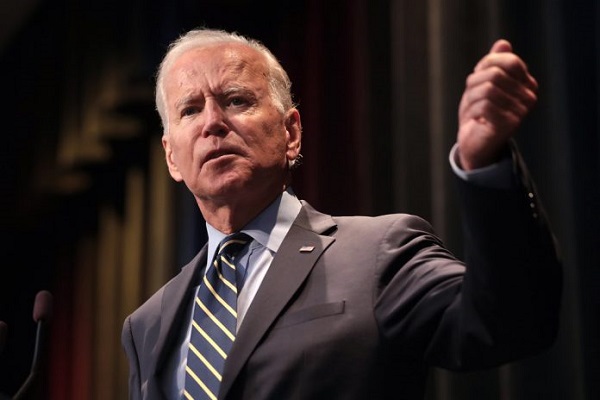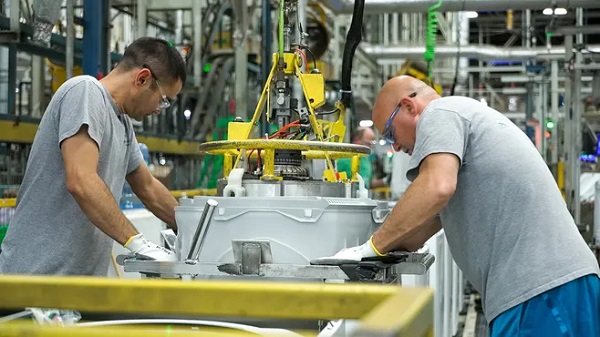Energy
Biden Talks Tough About NATO, but His Energy Policies Tell Different Story

From Heartland Daily News
By Steven Bucci of the Daily Signal
That faction must decide which is the priority: stopping Putin and helping our friends in Europe permanently leave the sway of Russia’s energy extortion, or crippling American energy companies to virtue-signal how “green” America can become. You can’t really have both.
President Joe Biden, host of the 75th anniversary NATO Summit in Washington that ends Thursday, last week claimed to ABC News anchor George Stephanopoulos that he “put NATO together.”
Trying to find a charitable spin on this claim, let’s assume Biden means that he helped NATO stand stronger against Russian President Vladimir Putin in the crisis over Russia’s 2022 invasion of Ukraine.
Biden certainly didn’t put together NATO, founded in 1949, regardless of his recollection. In that context, it makes one wonder about the purpose and intent behind Biden’s energy policies and their implications for our NATO allies.
The president’s words imply one thing, but his actions are exactly the opposite. At this week’s NATO Summit, America’s allies should have denounced Biden’s energy policies for benefiting Russia.
For example, if we investigate the Biden administration’s policies on liquefied natural gas, we find that rather than supporting NATO against Russia, they clearly enable Russia and disadvantage our allies. Biden’s imposition this year of an export moratorium on liquefied natural gas, or LNG, has hampered U.S. companies that are trying to aid our allies by weaning them off dependence on Russian natural gas.
You can debate Biden’s words (and his faulty memory), but his policies are simply dead wrong.
First, let’s look at Biden’s disastrous pause in exports of liquefied natural gas. The Energy Department has stopped new permits for such exports to Europe and Asia, which has led to price volatility and no assurance of reliable sources for our allies to meet their energy demands.
A federal judge in Louisiana recently reversed Biden’s moratorium. That action could eventually help allow private sector companies in the U.S. to support our allies in Europe and Ukraine.
One example of note includes Ukraine and Venture Global, an American company that wants to come to the rescue by supplying Ukraine and Europe with liquefied natural gas to help them reduce their dependence on Russian gas. Biden’s continued pause had stood in the way.
The judge in Louisiana noted that the Biden administration’s suspension of LNG exports conflicts with settled law such as the Natural Gas Act, which directs the Energy Department to “ensure expeditious completion” of permit reviews.
Biden’s LNG export moratorium also violates the Administrative Procedure Act, since there never was a congressional direction that the Energy Department impose it.
All of this is a clear conflict (again) between responsible policy and the extremist green faction of Biden’s Democratic Party and his administration. That faction must decide which is the priority: stopping Putin and helping our friends in Europe permanently leave the sway of Russia’s energy extortion, or crippling American energy companies to virtue-signal how “green” America can become.
You can’t really have both. And yet, ironically, new evidence demonstrates that U.S. exports of liquefied natural gas represent a climate-conscious solution. A recent Berkeley Research Group report found that these exports result in lower greenhouse gas emissions than does natural gas supplied by competing countries, and much lower emissions compared with coal.
The second example of this dangerous conflict is Biden’s support for a Middle East pipeline owned by the Russians. Here at least the president’s position seems to be nuanced, since a greater supply of oil could help lower energy prices.
Biden’s State Department has strongly supported restarting an oil pipeline that has been offline because of a political dispute among Kurdistan, Iran, and Turkey. Unfortunately, the pipeline is 60% owned by Rosneft, an oil company that itself is owned by the Russian state.
Oh, and a point I skipped above: We shouldn’t be helping Iran or a hostile Turkey to control or influence significant energy in any way. All this defies logic.
It’s obvious that Biden wants cheaper energy. Every president does in an election year. That said, why is the State Department supporting reopening a Middle East pipeline that’s majority-owned by the Kremlin after the Biden administration canceled infrastructure projects here at home?
The administration’s priorities are entirely misplaced.
There is a path forward. It involves reinforcing American leadership in domestic energy production. Instead of playing into the hands of our adversaries (Russia, Iran, and Venezuela), the Biden administration needs to change course and open more access to American oil and gas production.
That starts by permanently ending the suspension on LNG exports, ending the moratorium of oil and gas exploration on federal lands, ending unprecedented restrictions on offshore oil and gas leasing, ceasing resistance to the Canadian Enbridge Pipeline 5, and restarting canceled pipeline projects such as Keystone XL.
America’s energy resources are the envy of the world and should be leveraged to protect our citizens and our allies.
U.S. energy exports strengthen our competitive edge against China, Russia, and other hostile regimes. They also produce high-paying jobs at home and lessen dependence on any foreign source.
If America really wants to help Ukraine and be a leader in NATO, this is a path that will be consistent, effective, and inexpensive compared with direct financial or material support.
The green energy activists will hate it, but simply put: They’re wrong.
Steven Bucci is a visiting fellow in the Phillip N. Truluck Center for Leadership Development.
Originally published by The Daily Signal. Republished with permission.
Energy
China undermining American energy independence, report says

From The Center Square
By
The Chinese Communist Party is exploiting the left’s green energy movement to hurt American energy independence, according to a new report from State Armor.
Michael Lucci, founder and CEO of State Armor, says the report shows how Energy Foundation China funds green energy initiatives that make America more reliant on China, especially on technology with known vulnerabilities.
“Our report exposes how Energy Foundation China functions not as an independent nonprofit, but as a vehicle advancing the strategic interests of the Chinese Communist Party by funding U.S. green energy initiatives to shift American supply chains toward Beijing and undermine our energy security,” Lucci said in a statement before the Senate Judiciary Subcommittee’s hearing on Wednesday titled “Enter the Dragon – China and the Left’s Lawfare Against American Energy Dominance.”
Lucci said the group’s operations represent a textbook example of Chinese influence in America.
“This is a very good example of how the Chinese Communist Party operates influence operations within the United States. I would actually describe it as a perfect case study from their perspective,” he told The Center Square in a phone interview. “They’re using American money to leverage American policy changes that make the American energy grid dependent upon China.”
Lucci said one of the most concerning findings is that China-backed technology entering the U.S. power grid includes components with “undisclosed back doors” – posing a direct threat to the power grid.
“These are not actually green tech technologies. They’re red technologies,” he said. “We are finding – and this is open-source news reporting – they have undisclosed back doors in them. They’re described in a Reuters article as rogue communication devices… another way to describe that is kill switches.”
Lucci said China exploits American political divisions on energy policy to insert these technologies under the guise of environmental progress.
“Yes, and it’s very crafty,” he said. “We are not addressing the fact that these green technologies are red. Technologies controlled by the Communist Party of China should be out of the question.”
Although Lucci sees a future for carbon-free energy sources in the United States – particularly nuclear and solar energy – he doesn’t think the country should use technology from a foreign adversary to do it.
“It cannot be Chinese solar inverters that are reported in Reuters six weeks ago as having undisclosed back doors,” he said. “It cannot be Chinese batteries going into the grid … that allow them to sabotage our grid.”
Lucci said energy is a national security issue, and the United States is in a far better position to achieve energy independence than China.
“We are luckily endowed with energy independence if we choose to have it. China is not endowed with that luxury,” he said. “They’re poor in natural resources. We’re very well endowed – one of the best – with natural resources for energy production.”
He said that’s why China continues to build coal plants – and some of that coal comes from Australia – while pushing the United States to use solar energy.
“It’s very foolish of us to just make ourselves dependent on their technologies that we don’t need, and which are coming with embedded back doors that give them actual control over our energy grid,” he said.
Lucci says lawmakers at both the state and federal levels need to respond to this threat quickly.
“The executive branch should look at whether Energy Foundation China is operating as an unregistered foreign agent,” he said. “State attorneys general should be looking at these back doors that are going into our power grid – undisclosed back doors. That’s consumer fraud. That’s a deceptive trade practice.”
Business
Canada should already be an economic superpower. Why is Canada not doing better?

From Resource Works
Tej Parikh of the Financial Times‘s says Canada has the minerals but not the plan
Tej Parikh is the economics editorial writer for The Financial Times, a British daily newspaper. He joins our Stewart Muir for a Power Struggle interview. And we include in the following report some points from a guest column by Parikh in Canada’s National Post, which carried the headline ‘How Canada can unlock its economic superpower potential.’
Parikh begins the Power Struggle interview with this: “There’s an enormous economic potential here, very much the same geographic advantages that have underpinned America’s economic emergence over the last 100 years. . . . Given everything we understand about the advantages that countries need to grow, why is Canada not doing better economically?” He added: “When you break it down and you look at why income per capita in Canada has perhaps not increased as fast as we might expect on the basis of those advantages, it really kind of breaks down to three components. One is investment, so how much capital goes into the country?
The second is labour, and not just the amount, the size of the workforce you have, but how well you utilize the workforce. And then the third component is something that economists like to call a total-factor productivity, which is essentially your innovative ability and your ability to bring together capital and people. “And when you look at Canada as opposed to other large economies . . . you begin to see that actually there are a lot of restrictions in Canada, not just because of its vast geography but because of regulation, that it actually can’t combine its capital and labour as productively as it could.
“It’s about creating those supply chains and critical minerals that the Western world is currently short of. Given it (Canada) has these vast raw material resources, there is a massive scope for it to become even more integrated into Western supply chains in particular and to become a supplier of these things.” From Parikh’s National Post column: “The country is energy independent, with the world’s largest deposits of high-grade uranium and the third-largest proven oil reserves. It is also the fifth-largest producer of natural gas.Canada boasts a huge supply of other commodities too, including the largest potash reserves (used to make fertilizer), over one-third of the world’s certified forests and a fifth of the planet’s surface freshwater. Plus, it has an abundance of cobalt, graphite, lithium and other rare earth elements, which are used in renewable technologies. “But the nation has lacked the visionary leadership and policy framework to capitalize on its advantages.”
Watch the full interview here:
-

 Bruce Dowbiggin1 day ago
Bruce Dowbiggin1 day agoWhat Connor Should Say To Oilers: It’s Not You. It’s Me.
-

 Business1 day ago
Business1 day agoThe Passage of Bill C-5 Leaves the Conventional Energy Sector With as Many Questions as Answers
-

 Business1 day ago
Business1 day agoFederal fiscal anchor gives appearance of prudence, fails to back it up
-

 Business22 hours ago
Business22 hours agoCanada should already be an economic superpower. Why is Canada not doing better?
-

 Alberta1 day ago
Alberta1 day agoAlberta poll shows strong resistance to pornographic material in school libraries
-

 Banks1 day ago
Banks1 day agoScrapping net-zero commitments step in right direction for Canadian Pension Plan
-

 Crime23 hours ago
Crime23 hours agoFlorida rescues 60 missing kids in nation’s largest-ever operation
-

 Business2 days ago
Business2 days agoTRUMP TARIFFS: GE Appliances brings washer manufacturing back from China


